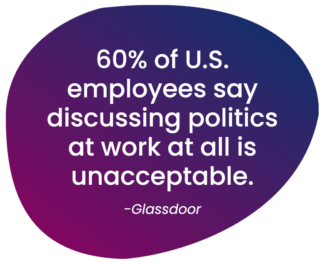
How employers can navigate political talk at work
AUG 19, 2024
How employers can navigate political talk at work
This article was originally posted in 2020 and was updated on August 19, 2024.
If your workplace is feeling like a tense zone of passionately contested politics these days, you’re not alone. Polarizing politics are seeping into just about every facet of our lives—including the workplace.
When we originally posted this article, it was just after the 2020 U.S. presidential election, when it seemed like society had reached peak polarization. But over the last four years, political debates have only heated up with people divided over U.S. involvement in the war in Ukraine, the Israel-Gaza war, vocal attacks on diversity, equity and inclusion (DEI) initiatives, and another presidential election approaching where both sides claim an existential crisis if their candidate loses.
So many people are feeling a very real sense of loss and fear. At the same time, a huge segment of the population is simply tired of hearing about politics everywhere they turn.
So, with another election just around the corner, how can employers navigate political talk at work and the mental health implications?
Risks of banning political talk at work
First, let’s look at the cautionary tale of Coinbase. The cryptocurrency exchange company went to one extreme and banned talk of politics, including social activism, altogether. In what CEO Brian Armstrong refers to as a policy of “political neutrality,” he explains in a Medium post, “We don’t engage here when issues are unrelated to our core mission, because we believe impact only comes with focus.”
But there was widespread push-back from within the ranks of Coinbase, colleagues in tech, and wider leadership circles. Armstrong offered severance packages to anyone who wanted to go elsewhere and at least 5% of employees immediately took him up on the offer.
Software company Basecamp experienced similar blow back when CEO Jason Fried announced that there would be “no more societal and political discussions on our company Basecamp account,” after which 1/3 of the workforce promptly resigned. Fast-forward three years later, though, and Fried calls this, “Probably one of the best decisions we’ve ever made. We’re far more focused now.”


On the surface, Coinbase and Basecamp were helping to promote the wishes of the majority of Americans: to keep discussions of politics out of the workplace. According to a Harris poll 70% of Americans say they would support company policies that limit the discussion of politics in the workplace, and Glassdoor found that 60% of U.S. employees say discussing politics at work at all is unacceptable.
Given the choice to ban one single topic of discussion in the workplace, 47% of people choose politics – four times higher than pop culture (12%), AI (10%) and sports (9%).
Employees want their companies to stand up for what they see as right
While employees don’t want divisive political talk in the office, they do want their employers speaking up in some cases. 64% of workers say they feel supported when their company takes a stance on an issue they care about. Of course, a stance that supports one group will likely alienate others, though, and cost you in terms of engagement, retention and recruitment.
It isn’t as simple as saying, “No election talk allowed.” Social justice has become a corporate issue, too. Since social justice stands as one of the single most pressing issues for many Americans—and a deciding factor in their voting preferences—it is increasingly difficult to divide the two.
Goodyear found themselves in hot water with conservatives in 2020 when they banned employees from wearing clothes that display Donald Trump’s slogan Make America Great Again as well as Blue Lives Matter, while expressly allowing the display of Black Lives Matter. But Goodyear Spokesperson Melissa Monaco explains that the policy is consistent with the company’s values and commitment to racial equality. “We do allow our associates to express their support on racial injustice and other equity issues but ask that they refrain from workplace expressions, verbal or otherwise, in support of political campaigning for any candidate or political party as well as other similar forms of advocacy that fall outside the scope of equity issues,” she says.
How companies can navigate political talk at work
As employers balance building a culture consistent with their values and limiting distracting or offensive political discussions in the office (including Slack channels), here are four actionable steps to help companies navigate political talk at work:
1. Establish policies around political expression in the workplace
When establishing policies around political expression, companies need to lead with their values and be consistent. Policies should be clear on what is prohibited at work, (e.g. pins, T-shirts, or posters that endorse a specific candidate) as well as what is permissible. Flexible policies that focus on scenarios most likely to cause distraction or be interpreted as disrespectful are more practical than trying to outline an exhaustive list of approved and prohibited practices.
When Quorum, a software company in the public policy space, noticed employees condemning one another over opposing stances on the Israel-Gaza war, they quickly issued rules to keep conversations respectful without silencing employees:
- Be aware of how your statements could be received by someone who doesn’t agree with your views.
- Link to a document with a longer opinion so the channels don’t get clogged up.
- If you’re unsure about your language, let HR review it.
2. Promote Diversity Equity + Inclusion
A strong infrastructure that already cultivates DEI will serve companies well in divisive situations like an election. The key is to make sure no one is othered based on their political beliefs. This is a good time to revisit policies on harassment or bullying and offer a refresher training to employees.
3. Endorse voting, not candidates
Election talk doesn’t have to be about the candidates. Many companies are getting involved by advocating for their employees to get out and vote, staying safely away from mentioning either candidate or party. In 2020, Under Armour created a multi-audience campaign intended to encourage both employees and customers to get informed and vote this season. In the athletic retailer’s “Run to Vote” campaign, former President & CEO Patrick Frisk said “We are here to empower those who strive for more. I want to make sure people are provided every opportunity to have their opinion heard and exercise it in an informed way. It’s as simple as that.”
4. Recognize the impact on mental health
 Fear, disappointment, sadness, and anxiety brought on by the election—no matter the outcome—are just as real and deserving of employer support as stress brought on by working during the pandemic or other underlying mental health stressors that are at an all-time high. We can create safe space to talk about how employees are feeling about the election or outcome, without engaging in political debate. This is where managers need to lead by example—showing that they are willing to share their feelings, while processing the political implications in private.
Fear, disappointment, sadness, and anxiety brought on by the election—no matter the outcome—are just as real and deserving of employer support as stress brought on by working during the pandemic or other underlying mental health stressors that are at an all-time high. We can create safe space to talk about how employees are feeling about the election or outcome, without engaging in political debate. This is where managers need to lead by example—showing that they are willing to share their feelings, while processing the political implications in private.
Contentious politics are not going to disappear on November 5th. And employees are not going to be able to compartmentalize the negative feelings and stress they experience following the election. That doesn’t mean the workplace is destined to serve as the political town square, though. It’s up to employers to take the lead on establishing policies, setting examples, and cultivating a company culture that fits with their values to promote an inclusive and healthy workplace.



